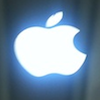Considering Apple’s heavy use of Qualcomm components, the company’s recent strong report and guidance were largely anticipated. Now that QCOM is a key vendor for the iPhone empire, it is getting a major boost from Apple‘s winter share gains.
 Forbes Reports:
Forbes Reports:
But one number in the report really popped out – Qualcomm is raising its average 3G/4G device selling price estimate by a full $7, into $204-$216 range. That is a stunning hike and could give the stock a multi-week tailwind.
Two other numbers make the guidance particularly sizzling:
- Against all expectations, Qualcomm did not lower European unit guidance. After massive misses from Euro-centric vendors like HTC and Sony Ericsson, this was a jolt. It also implies that the Android vendor comments about European market weakness are suspect. That “market softness” might in fact be market share losses to Apple.
- China/India volume projection rose by 7 Million units. This comes after RFMD cited Chinese 2G weakness for its recent warning. Which means that China may be experiencing faster than anticipated shift from 2G to 3G handsets – not overall weakness of the handset market. The Chinese volume projection hike is an interesting fit with the device ASP increase. Asian 3G prices may be higher than markets have expected.
Compare this report and guidance with the recent Nvidia warning. Nvidia cited Tegra 2 weakness as one factor for its revenue softness. Tegra 2 is the engine of Android dual-core smartphones and tablets. These are the direct rivals of the iPhone 4S and iPad 2.
Apple’s strength is reshaping the entire component market. The Qualcomm and Nvidia reports hint that the pace of change is faster than investors had anticipated.
It is possible that soon the entire high end handset/tablet component market may be completely at Apple’s mercy. If the Android market fades in 2012, the power Apple would possess with its component vendors could start to resemble the hold Nokia had back in 2007.
Nokia had a 50-60% share of the smartphone market until it was shattered by the Apple/Android upstarts in 2010.
The balance of power between component buyers and component sellers may be about to shift in a fairly radical way over the next 24 months.


